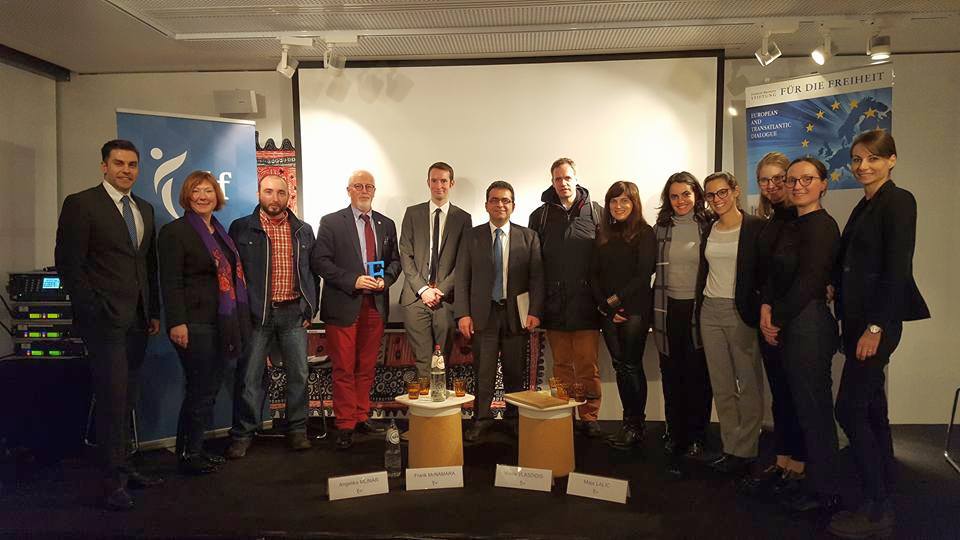Managing the Migration Crisis, Finding Liberal Answers

Group Photo of Panelists, ELF and FNF Organizers
How could liberals contribute with their proposals towards opinion shapers to alleviate the refugee crisis? The final round of discussions on this topic which had started May in Lesbos/Greece and had moved along the Western Balkan Route via Sofia/Bulgaria to Belgrade/Serbia took place on November 29th in Brussels.
Around 70 participants listened to the experts on two panels from politics and civil society in Brussels. “Fair share, fair chance? – Managing migration flows in a web of institutions” reflected the discrepancy between a (necessary) technical approach and the human dimension. Roderick Parkes, Senior Analyst from the EU Institute for Security Studies (EUISS), provided his assessment of the measures taken by EU stakeholders so far. According to his view, Frontex is not more effective because it has now more personnel than six months ago. Should the EU respect national borders such as in Libya when it becomes apparent that failed states are clearly not in a position to control their national borders? If the EU is not in able to control its external borders it loses credibility and national states will come up with their tailor made solutions (building fences towards their neighbours as the example of Hungary shows). István Dobo, policy officer from the EC, contradicted this to his point of view negative view. Frontex had been able to intercept more refugees from the Mediterranean Sea than last year, hot spots are fully functional and generally the EU has moved with remarkable speed to solve upcoming challenges. Tsvetko Tsankovski from the Refugee Support Group Bulgaria disagreed. Apart from creating new structures the situation on the ground has not really changed for the refugees. Neither the EU, nor the neighbouring countries, are prepared for a new mass influx of refugees. His main point: The EU has rather contained but not managed the refugee crisis. “We need to think large”
Have a look at the photos from the event:
“If worst comes to worst, nationals come first” unfortunately is a sad truth in the nowaday’s EU everyday life. Angelika Mlinar, MEP from Austria demanded on this second panel a common asylum and migration policy. Openly populist/nationalists question unique values which have been codified in the Geneva Conventions. Populists/nationalists instigate fear in societies and thus correspond much more successful than established Conservative/Socialist parties to a gloomy sentiment within parts of the population being afraid of any changes to their daily life or losing their social status because of others. As a liberal Mlinar speaks up. To take fears seriously is one thing, to respond with a positive vision and humour might be the best antidote to the poison of fear. “Fight war mongers with humour”. Maja Lalic from Belgrade’s refugee centre “Miksaliste” encouraged the audience to look upon the “Refugee question” not always in terms of crisis and unresolved problems but as a chance for change, e.g. modernization of societies. Who but not the liberals one may ask are best suited to take up this task? Vlasis Vlasidis agreed that things have been slightly improved, however if it were the same amount of people trying to reach Central Europe via Greece as in the summer of 2015 these structures would not hold. Maja Lalic agreed that the same conclusion must be drawn for Serbia. The structures which were created look to the outside world sustainable but more than thousands refugees a day would make them collapse.
What liberal answers could be given after the series of four events in Lesbos, Sofia, Belgrade and Brussels:
1. Establish a common asylum and migration policy.
2. Go beyond containment. Provide substantial support to countries neighbouring conflict zones.
3. Speak up for universal human rights because they are a cornerstone of any democracy.
4. Keep the EU-Turkey deal separate from possible EU accession talks with Turkey.
5. Fight fear in and outside EU with positive visions and humour.
The four-tier-project financed by the European Liberal Forum (ELF) and co-organized by two regional offices of FNF- FNF East and Southeast Europe and FNF European and Transatlantic Dialogue.
Author: Charles du Vinage, FNF Project Director for Western Balkans